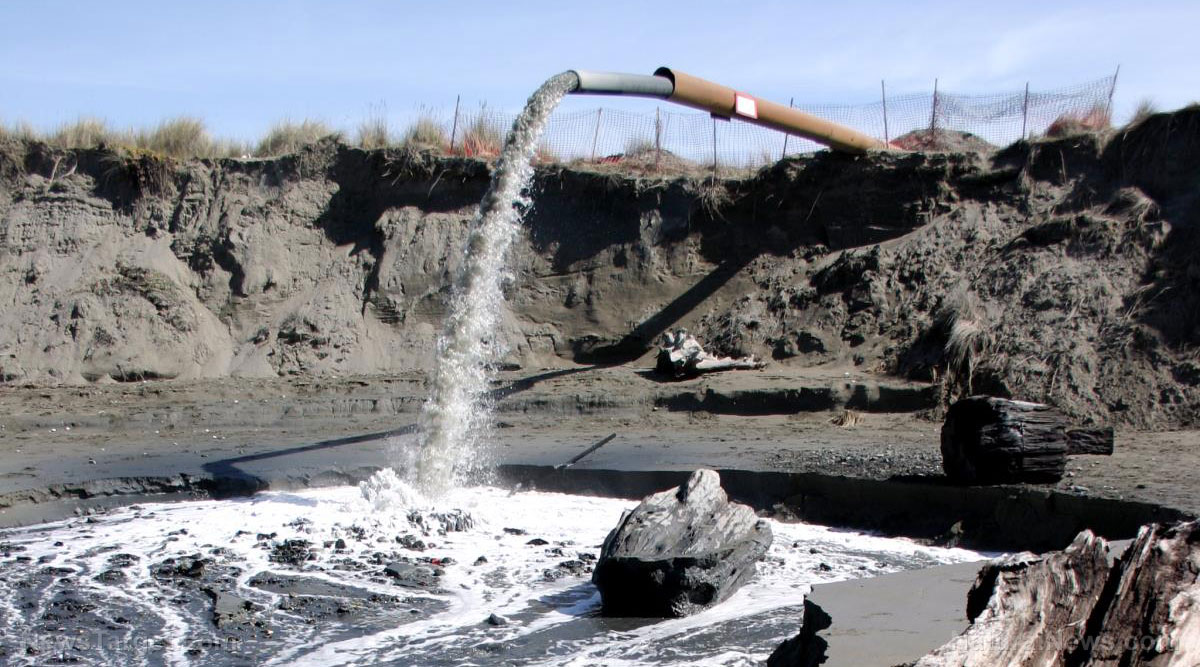PFAS pollution sparks legal battles across Maryland
By willowt // 2025-05-16
Tweet
Share
Copy

- Maryland has become a focal point in the national fight against PFAS contamination, with Salisbury residents threatening legal action against Perdue Agribusiness and the Maryland Attorney General suing W.L. Gore and Associates for allegedly releasing these "forever chemicals" into the environment.
- PFAS are persistent chemicals used in various industrial and consumer products, linked to serious health issues such as cancer, liver damage and reproductive problems. Elevated levels of PFAS in Maryland communities have raised concerns about their long-term impact on public health and the environment.
- The Salisbury case underscores the agricultural community's struggle with PFAS pollution, as Perdue Agribusiness is accused of contaminating local groundwater through improper disposal of wastewater and sludge. PFAS have also been found in pesticides, exacerbating concerns about their widespread presence in agricultural areas.
- Perdue has installed PFAS treatment systems and provided bottled water, but critics argue these measures are insufficient. The Maryland Attorney General's lawsuit against W.L. Gore, alleging awareness of PFAS dangers and inadequate prevention measures, marks the second major PFAS-related lawsuit in less than a year, highlighting a trend of state-level action for corporate accountability.
- PFAS contamination is a national issue with far-reaching health consequences, even at low exposure levels. The legal battles in Maryland serve as a call for stronger regulations, greater corporate accountability and increased public awareness about the risks of PFAS. The outcomes of these cases could set a precedent for future litigation and shape how PFAS contamination is addressed nationwide.
The rise of PFAS contamination
PFAS, known for their persistence in the environment, have been widely used in industrial and consumer products for decades. They are found in everything from non-stick cookware to firefighting foams and pesticides. Despite their utility, PFAS are increasingly recognized for their harmful effects on human health, including links to cancer, liver damage and reproductive issues. The recent discovery of elevated PFAS levels in Maryland communities has raised alarms about the long-term impacts of these chemicals on public health. The Salisbury case underscores the broader agricultural community's struggle with PFAS pollution. Perdue Agribusiness, a major soybean processing facility, has been accused of contaminating local groundwater through improper disposal of wastewater and sludge. PFAS have also been detected in pesticides, amplifying concerns about their widespread presence in agricultural regions.Salisbury residents file notice of intent to sue Perdue Agribusiness
Attorneys for Salisbury residents delivered a stark warning to Perdue Agribusiness in April, threatening legal action under the Resource Conservation and Recovery Act (RCRA) if the company continues to release PFAS. The notice follows a class action lawsuit filed in October 2024, which seeks to hold the company accountable for PFAS contamination and to establish a medical monitoring program for affected residents. Perdue has yet to confirm the source of the PFAS contamination, though preliminary investigations suggest it may stem from wastewater discharge or the refining process. The company has taken some steps to address the issue, including installing PFAS treatment systems for affected properties and providing bottled water to residents. However, critics argue these measures are insufficient and that the company has been slow to act despite evidence of contamination.Maryland sues W.L. Gore over PFAS pollution
Meanwhile, the Maryland Attorney General has taken legal action against W.L. Gore and Associates, accusing the company of contaminating groundwater with PFAS. The lawsuit alleges that W.L. Gore was aware of the dangers of PFAS but failed to take adequate measures to prevent their release. PFAS levels at some of the company's facilities have reached levels far exceeding federal guidelines, raising concerns about long-term health impacts for nearby communities. This case marks the second major PFAS-related lawsuit filed by Maryland's Attorney General in less than a year, signaling a growing trend of state-level action to address corporate accountability for environmental harm.The broader implications of PFAS contamination
PFAS contamination is not limited to Maryland; it is a national issue with far-reaching consequences. Studies have shown that even low levels of PFAS exposure can lead to serious health problems, including cancer and developmental issues. The recent discovery of PFAS in the blood of Maryland residents highlights the ubiquity of these chemicals and the need for stronger regulations to limit their use. While companies like Perdue and W.L. Gore have taken some steps to address PFAS contamination, critics argue that more must be done to protect public health and hold corporate polluters accountable. "There's certainly more that needs to be done," said Maryland Attorney General Anthony Brown, emphasizing the importance of regulatory oversight and corporate responsibility. The legal battles in Salisbury and Cecil County represent a turning point in the fight against PFAS pollution. They also serve as a reminder of the need for stronger regulations, greater corporate accountability and increased public awareness about the risks of these "forever chemicals." As studies continue to uncover the health impacts of PFAS, the pressure on governments and industries to act will only grow. The outcomes of these cases could set a precedent for future litigation and shape the way PFAS contamination is addressed nationwide. One thing is clear: the fight against PFA chemicals is far from over. Sources for this article include: ChildrensHealthDefense.org ENH.org WBALtv.comTweet
Share
Copy
Tagged Under:
agriculture toxins chemicals poison toxic chemicals toxic water big government maryland ecology dangerous contamination revolt resist uprising clean water Big AG progress PFAS waste water outrage environ badhealth badpollution Perdue Agribusiness
You Might Also Like
New Golden Age? Trump’s Qatar pact drives $1.2T in deals, centering U.S. interests
By Willow Tohi // Share
FDA greenlights 3 natural food dyes as synthetic toxins get phased out under RFK Jr.
By Cassie B. // Share
The disappearing bees: A crisis threatening your food and health
By Willow Tohi // Share
Thwarted ISIS plot on Michigan military base highlights ongoing domestic terror threat
By Willow Tohi // Share
Recent News
Mysterious seashell photo raises questions about FBI Director and POTUS safety
By finnheartley // Share
Unveiling the hidden impact of trauma: How unresolved pain shapes health and happiness
By finnheartley // Share










